Books
Here is some information about the books that I have written or edited.
Monographs
Edited Volumes
Books in Translation
Monographs
* * *
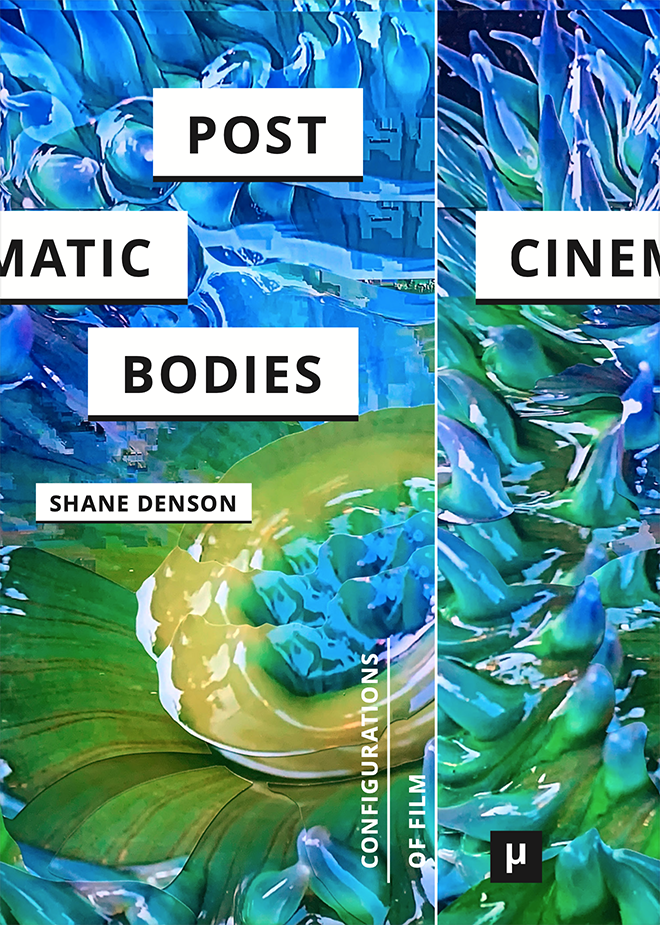
Post-Cinematic Bodies. meson press, 2023.
How is human embodiment transformed in an age of algorithms? How do post-cinematic media technologies such as AI, VR, and robotics target and re-shape our bodies? Post-Cinematic Bodies grapples with these questions by attending both to mundane devices — such as smartphones, networked exercise machines, and smart watches and other wearables equipped with heartrate sensors — as well as to new media artworks that rework such equipment to reveal to us the ways that our fleshly existences are increasingly up for grabs. Through an equally philosophical and interpretive analysis, the book aims to develop a new aesthetics of embodied experience that is attuned to a new age of predictive technology and metabolic capitalism.
Endorsements:
"We have long been feeling how the type of embodied identification suggested by the Hollywood classics was in a process of dissolution. Thanks to a sophisticated mediation between the phenomenology of perception and theories of digital media, Shane Denson provides us with concepts and a first understanding of this transition and its far-reaching existential consequences." — Hans Ulrich Gumbrecht, Stanford University
"What if digital media changed not only traditional forms of communication, but also our very bodies, because of the way they address us? In this brilliant study, Shane Denson suggests that, from a phenomenological perspective, our bodies are always at the forefront of our mediation with the world; digital media involve our sensorium in an unprecedented way and this commitment represents their true "revolution." A myriad of examples, including screens in gyms aimed at enhancing our exercises, are proof of this. Philosophically dense, analytically sharp, this book unearths what lies beneath our digital experiences." — Francesco Casetti, Yale University
"Refusing both the perfunctory valorization of the body as site of resistive potentiality and the diametric reflex to dismiss theories of embodiment as exercises in the foreclosure of criticality, Shane Denson advances a rigorous theory of mediated corporeality within the metabolic life of post-cinema, with profound implications for the politics of (counter-)capture across microtemporalities and planetary scales." — Rizvana Bradley, University of California, Berkeley
Available now in free open-access and paperback versions! See the meson press website for more information.
* * *
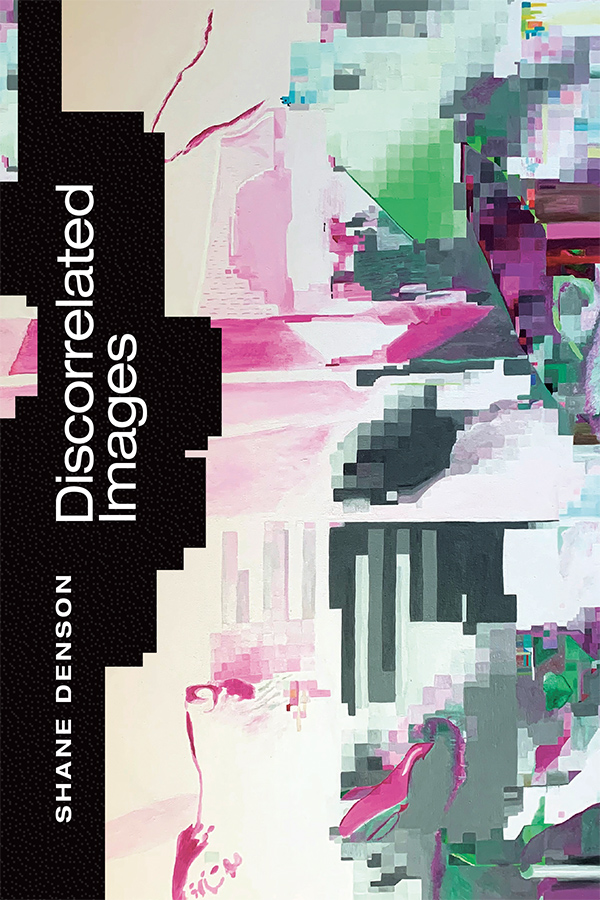
Discorrelated Images. Duke University Press, 2020.
— Shortlisted for the 2021 Association for the Study of the Arts of the Present (ASAP) Book Prize —
Discorrelated Images explores the transitional spacetime between cinema and post-cinema. More precisely, it probes the transformational temporal and spatial articulations of contemporary moving images and our perceptual, actional, and affective interfaces with them as they migrate from conventional forms of cinema and enter the computational systems that now encompass every aspect of audiovisual mediation. While the generation, composition, distribution, and playback of images increasingly become a matter of algorithms, software, networks, and codecs, our sensory ratios (as McLuhan called them) are being reordered, our perceptual faculties are being reformed (or re-formed) in accordance with the new speeds and scales of imaging processes. In a post-cinematic media regime, that is, both the subjects and the objects of perception are radically transformed. Older relations – such as that between a human subject and a photographically fixed object – are dissolving, and new relations are being forged in the microtemporal intervals of algorithmic processing. With the new objects of computational images emerge new subjectivities, new affects, and uncertain potentials for perception and action.
Endorsements:
"Addressing some of the most important issues faced by film and media scholars today, Shane Denson gives a surprising and highly cogent account of the changes that make for our current experience of 'postcinematic' audiovisual media. He powerfully shows how broad socio-technological forces work in the realm of visual media and suggests ways that such media can help us to grasp the scale and effects of those forces. An important book, Discorrelated Images offers major new contributions to film and media studies." — Steven Shaviro, author of The Universe of Things: On Speculative Realism
"Theoretically brilliant in its phenomenological conceptualization of discorrelation, Shane Denson's book reveals the perceptual and aesthetic discontinuities and continuities between film-based and digitally rendered cinema. Most significantly, Denson argues that understanding the effects of discorrelation and its expansion of our ways of seeing and being may provoke greater awareness of our existential precarity. A groundbreaking work." — Vivian Sobchack, author of The Address of the Eye: A Phenomenology of Film Experience
"Denson's book will, I predict, help migrate these discussions [around "correlationism"] from philosophy directly into media theory, a discipline arguably better equipped to consider questions of representation, analogy, and reproduction." — Alexander R. Galloway, New York University

— Bernard Dionysius Geoghegan, King's College London
"A fantastic meditation on post-cinema that begs the reader to consider both the horrors and possibilities afforded with technological advancements." — T. R. Merchant-Knudsen, in Film International
"I have always wondered what it might have been like to read the first edition of, say, Daniel Bell’s The Cultural Contradictions of Capitalism (1976), or Ulrich Beck’s Risk Society (1992) – that is, before such texts became widely recognized as the important works they are. Reading Denson’s dense and ambitious book is as close as I have yet come to achieving that feeling." — Marcus Maloney, in Thesis Eleven
"Virtuosic." "For anyone concerned with digital media in particular and media theory in general, Discorrelated Images is essential reading." — Christian de Moulipied Sancto, in Film-Philosophy
"The theoretical stakes of the book ... are very high: it is neither a question of looking at these developments of the digital image as a mere aesthetic question of style, nor of remaining trapped in the problem of the technical infrastructure underlying these images. It is a question of understanding the transformative impact that new image technologies have in explaining experience, in the establishment of the subject-object relationship and therefore in the process of individuation, to return to Stiegler, both singular and collective." — Angela Maiello, in Imago
Click here for a preview of the book; read the Introduction (PDF); and see the Duke University Press website for more information or ordering. Also: read a conversation about the book with Caetlin Benson-Allott here or listen to the audio of the German book launch, where I was in conversation with Bernard Dionysius Geoghegan here.
* * *
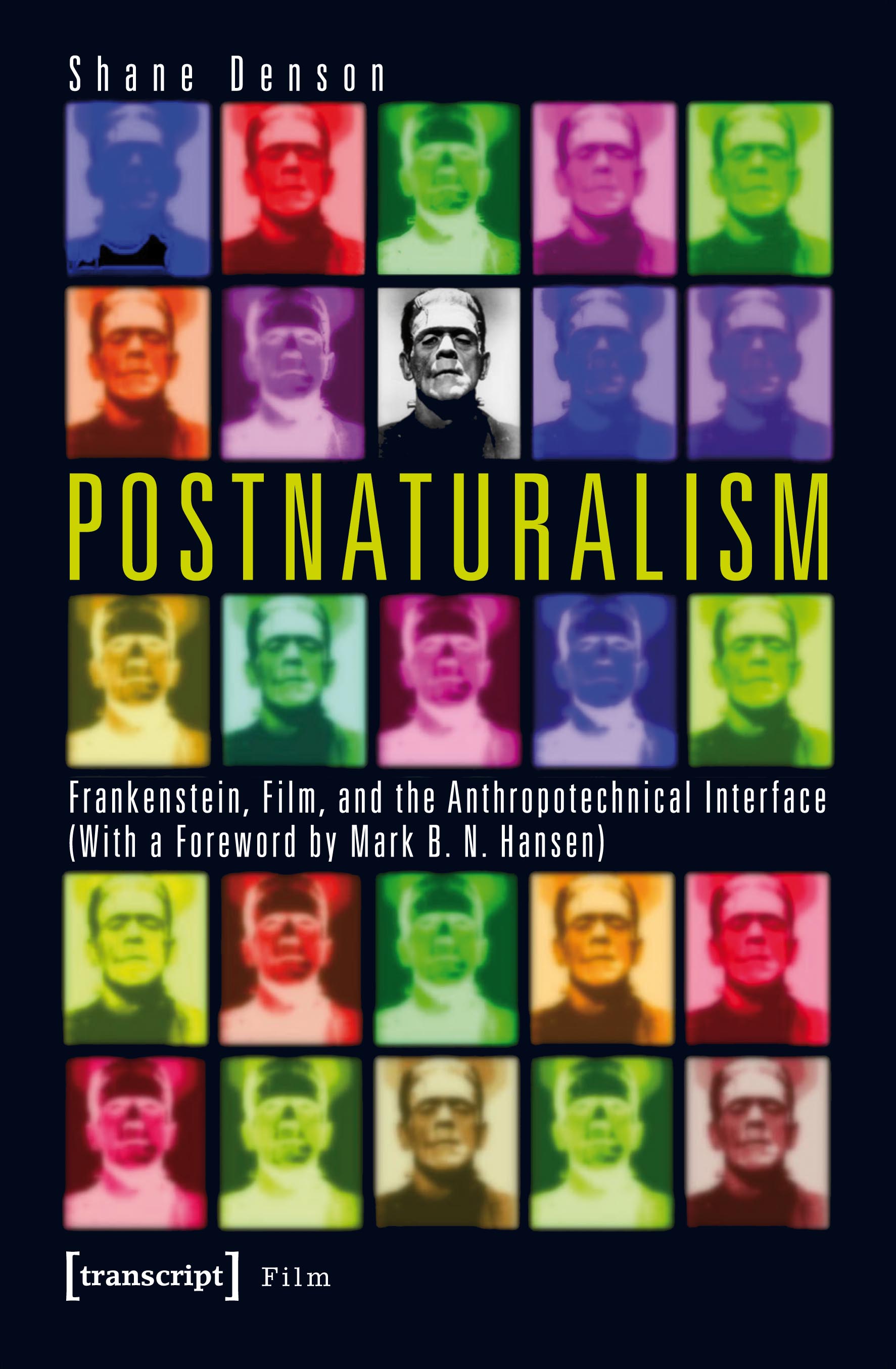
Postnaturalism: Frankenstein, Film, and the Anthropotechnical Interface. Transcript-Verlag/Columbia University Press, 2014.
Postnaturalism offers an original account of human-technological coevolution and argues that film and media theory, particularly, needs to be reevaluated from the perspective of material interfaces in a constantly changing environment. Extrapolating from Frankenstein films and the resonances they establish between a hybrid monster and spectator hooked into the machinery of cinema, Shane Denson engages debates in science studies and the philosophy of technology to rethink histories of cinema, media, and technology and the affective channels of our own embodiment. The book includes a foreword by media theorist Mark B. N. Hansen.
Endorsements:
"Shane Denson's Postnaturalism develops [an] ambitious, wide-ranging, and deeply compelling argument concerning the originary operation of media in a way that sketches out a much-needed alternative to destructive developments which, expanding the darker strains of poststructuralist anti-humanism, have pitted the human against the material in some kind of cosmological endgame. Postnaturalism will provide a very powerful and timely addition to the literature on posthuman, cosmological technogenesis. Perhaps more clearly than any other account, it reconciles the irreducibility of phenomenality and the imperative to move beyond anthropocentrism as we seek to fathom the postnatural techno-material revolutions that have repeatedly remade and that will no doubt continue to remake the environments from which we emerge and to which we belong before we become and as a condition of becoming human subjects." — Mark B. N. Hansen, Duke University

— Colin Milburn, U.C. Davis, Respawn: Gamers, Hackers, and Technogenic Life
"Postnaturalism offers a philosophical approach and an engagement with fundamental ontological and phenomenological questions of human and nonhuman materiality, which is indispensable especially for a post-postmodernity characterized by resource scarcity, climate change, and species extinctions, as well as the threat of a return to essentialist positions in politics and popular culture. Adapting a phrase from Bruno Latour, Denson counters the latter with a postnatural position: 'We have never been natural' (24). Furthermore, Denson’s detailed examination – at the level of content, reception, and production – of Frankenstein adaptations is an asset for the analytical and production-aesthetic [produktionsästhetische] investigation of a central text (or modern myth) and its many adaptations in a wide range of text-critical disciplines: from media studies to literary to cultural studies." — Anya Heise-von der Lippe, Tübingen/Berlin, MEDIENwissenschaft
"Constantly dwelling on the question of historical contingency, media materiality, technology, and (post-)human becoming in a series of interlocking theoretical reflections and analyses, Denson's book is a theoretical and methodological tour de force that conceptualizes film [...] as “Frankensteinian technology” and by way of techno-phenomenological inquiry, decidedly materialist genealogy, and ontological arguments makes a bold case for what he calls "postnaturalism" as both research paradigm and emphatically post-postmodern metaphysics." — Dennis Büscher-Ulbrich, Kiel, Literatur in Wissenschaft und Unterricht
See the Columbia University Press website for more information, or preview the book online.
* * *
Monographs
Edited Volumes
Books in Translation
Edited Volumes
* * *
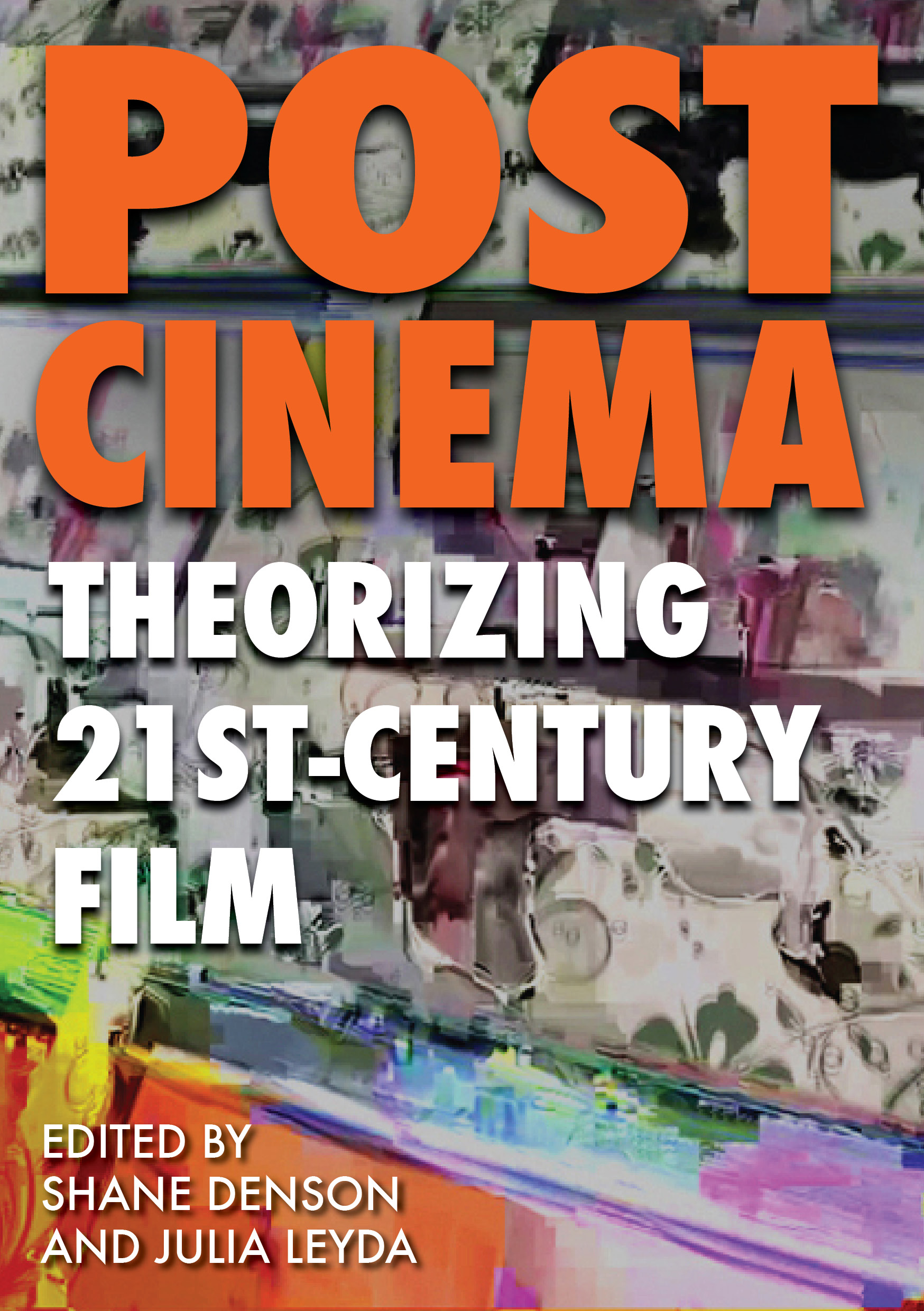
Post-Cinema: Theorizing 21st-Century Film. Edited by Shane Denson and Julia Leyda. REFRAME Books, 2016.
NEW! four-volume print edition, 2023.
If cinema and television, as the dominant media of the 20th century, shaped and reflected our cultural sensibilities, how do new digital media in the 21st century help to shape and reflect new forms of sensibility? In this open-access collection, editors Shane Denson and Julia Leyda have gathered a range of essays that approach this question by way of a critical engagement with the notion of "post-cinema." The contributions take as their critical starting-points concepts such as David Bordwell's "intensified continuity" or Steven Shaviro’s "post-cinematic affect" and "post-continuity." They expand and build upon the ideas of these and a range of other thinkers, with the goal of coming to terms with an apparently new media ecology that requires us to search for a fresh critical vocabulary. By examining the experiential, technological, political, historical, and ecological aspects of the transition from a cinematic to a post-cinematic media regime, the chapters explore key questions in breaking this new ground, seeking and articulating both continuities and disjunctures between film’s first and second centuries. Questions of aesthetics and form overlap with investigations of changing technological and industrial practices, contemporary formations of capital, and cultural concerns such as identity and social inequalities. The impact of digitization on taken-for-granted conventions is also in play: intermediality, new forms of distribution both licit and illicit, academic and critical reliance on genres and discrete media formats – all of these come under scrutiny as paradigms shift in the post-cinematic era.
Endorsements:
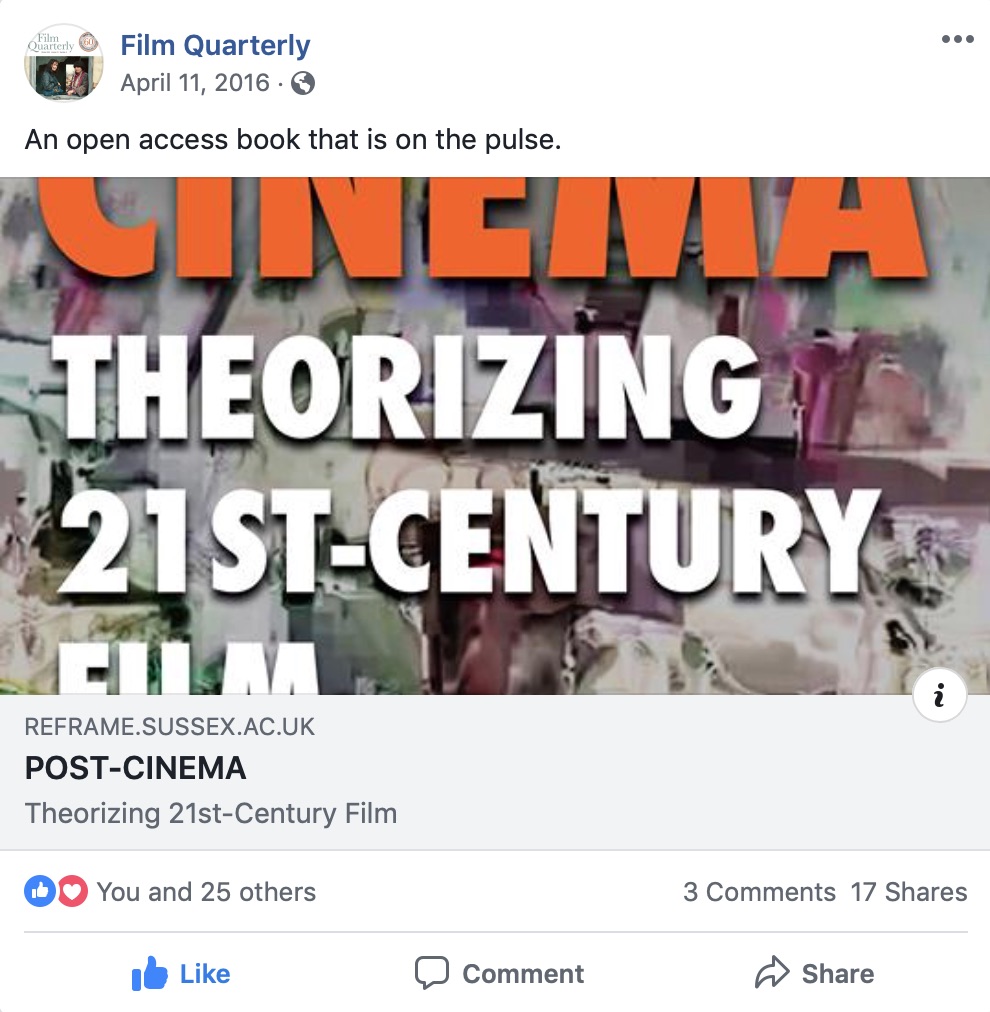
"An open access book that is on the pulse." — Film Quarterly
"This is the kind of volume that helps define and galvanize scholarly discourse, particularly when the subject matter is still so new and deserving of scrutiny, as is the case with digitality." — Alexander R. Galloway, New York University
"Shane Denson and Julia Leyda's comprehensive volume Post-Cinema: Theorizing 21st-Century Film, an open access online publication by Reframe Books, presents a multifaceted compendium. [...] The editors' framing in Post-Cinema is precise and penetrating, flexible enough to accommodate enduring themes in film and media studies while also making allowances for new questions associated with topics such as digital media aesthetics, media archaeology and environmental studies. Their volume rejects the idea that postcinema is merely a successor to cinema or a step in the teleological digitalization of all media, instead identifying it with competing perspectives on a changing media situation that bears on cinema as an institution, a practice and a medium. In this respect the volume admirably addresses our changing media landscape." — Lisa Åkervall, University of Gothenburg, Screen 59:1 (2018)
"Post-Cinema: Theorizing 21st-Century Film is an intellectually exciting and important book. Editors Shane Denson and Julia Leyda have assembled an extraordinary range of notable contributors with the aim to open up a critical conversation on the very notion of the post-cinematic — something they achieve in a most novel and engaging way. Through essays and roundtable discussions, Post-Cinema formulates fresh and nuanced questions about the consumption and spectatorship of post-millennial film and other media as they circulate through contemporary digital media ecologies. As is fitting given its subject matter of changing media formats, the design and layout of this book — with its open access digitality and its collaborative dialogues — is as relevant and pioneering as its content. Inviting us to rethink received ideas about how 21st-century media reshape "new forms of sensibility," Post-Cinema: Theorizing 21st-Century Film is critically imperative reading for anyone interested in ongoing vital transformations in moving image media." — Tanya Horeck, Reader in Film, Media, and Culture, Anglia Ruskin University
"Taken together, the chapters of the book [...] provide a rigorous and timely set of theoretical frameworks for analyzing post-cinematic works and contexts. At the same time, such frameworks are hardly prescriptive or standardized. Instead, the collection draws out and celebrates the diversity of thought around post-cinema as an on-going conversation." — Matilda Mroz, University of Sussex
"The essays and discussions that have been assembled in Post-Cinema: Theorizing 21st–Century Film provide the reader with a remarkably comprehensive and compelling survey of the diverse critical and theoretical responses to the formal, technological, affective, political and ecological dimensions of our contemporary post-cinematic landscape. That landscape now has an authoritative and inspirational field guide: by gathering together foundational interventions alongside the most recent contributions this collection will prove indispensable to anyone wishing to take these conversations forward." — Michael Lawrence, Reader in Film Studies, University of Sussex
The complete book is freely available online at REFRAME Books (HTML), or download a PDF version here. A four-volume print edition is also available for purchase: Volume I, Volume II, Volume III, Volume IV.
* * *
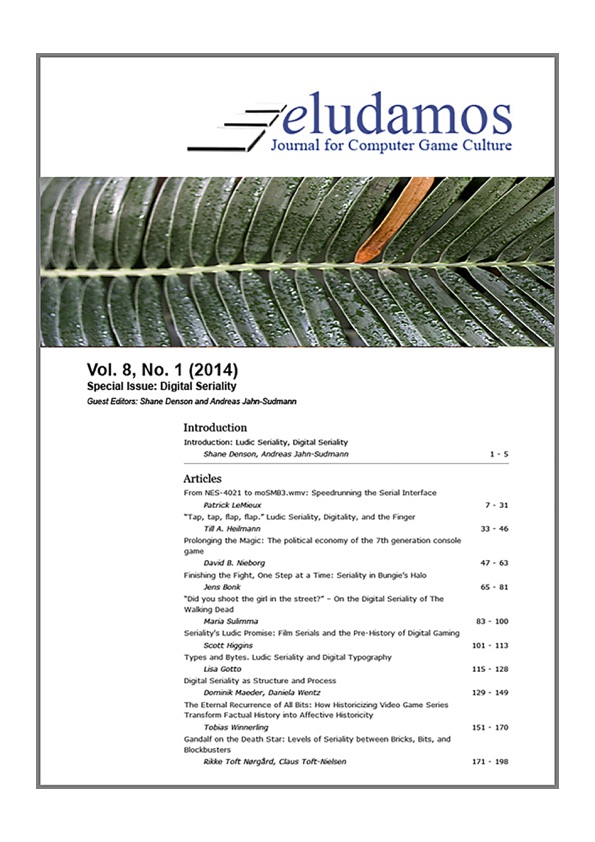
Digital Seriality. Edited by Shane Denson and Andreas Jahn-Sudmann. Special issue of Eludamos: Journal for Computer Game Culture Vol. 8, No. 1 (2014).
Seriality is a central and multifaceted but largely neglected dimension of popular computer and video games. Seriality is a factor not only in explicitly marked game series (with their sequels, prequels, remakes, and other types of continuation), but also within games themselves (e.g. in their formal-structural constitution as an iterative series of levels, worlds, or missions). Serial forms of variation and repetition also appear in the transmedial relations between games and other media (e.g. expansive serializations of narrative worlds across the media of comics, film, television, and games, etc.). Moreover, specifically digital serialities challenge the temporal procedures and developmental logics of the analog era, e.g. because once successively appearing series installments are increasingly available for immediate, repeated, and non-linear forms of consumption. And while this media logic of the database (as Lev Manovich has termed it) can be seen to transform all serial media forms in our current age of digitization and media convergence, a careful study of the interplay between real-time interaction and serialization in digital games sheds light on the larger media-aesthetic questions of the transition to a digital media environment. As this collection bears out, digital games are not only symptoms and expressions of this transition, but also agents in the larger networks through which it has been navigated and negotiated; serial forms, which inherently track the processes of temporal and historical change as they unfold over time, have been central to this media-cultural undertaking.
The collection is freely available online at Eludamos: Journal for Computer Game Culture.
* * *
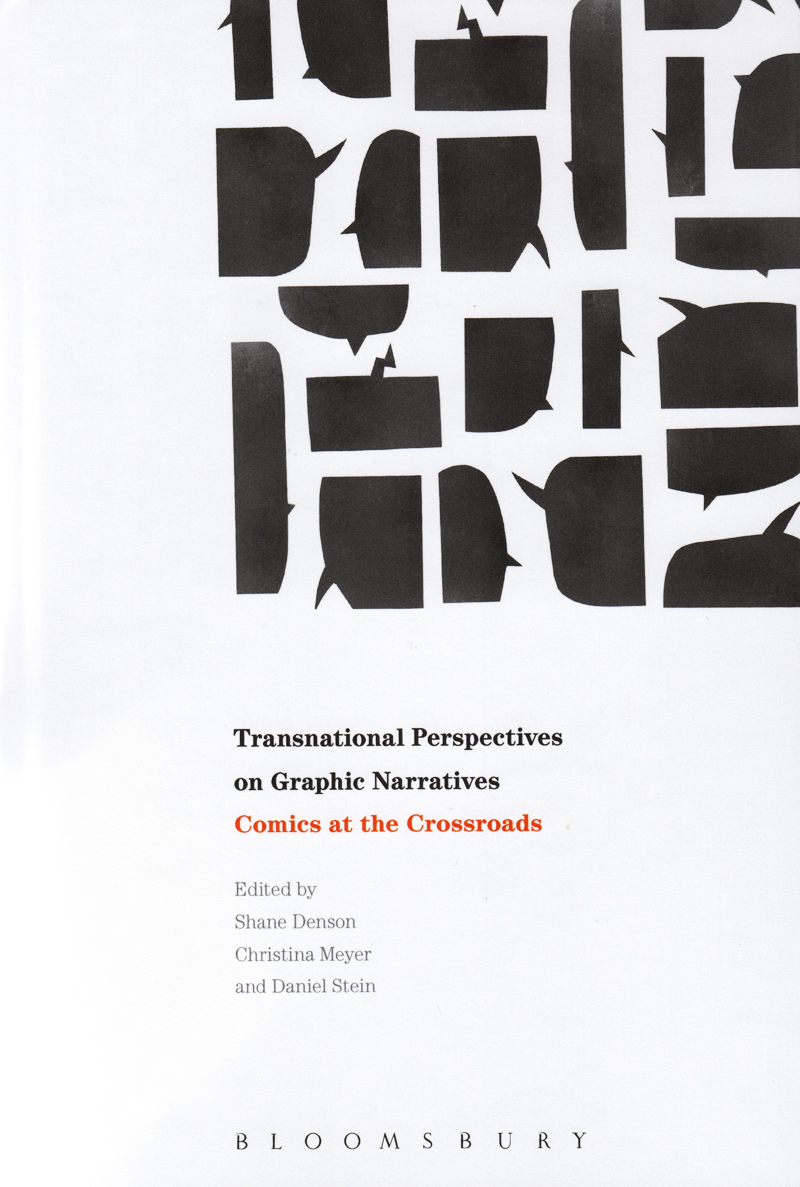
Transnational Perspectives on Graphic Narratives: Comics at the Crossroads. Edited by Shane Denson, Christina Meyer, and Daniel Stein. Bloomsbury, 2013.
This book brings together an international group of scholars who chart and analyze the ways in which comic book history and new forms of graphic narrative have negotiated the aesthetic, social, political, economic, and cultural interactions that reach across national borders in an increasingly interconnected and globalizing world. Exploring the tendencies of graphic narratives – from popular comic book serials and graphic novels to manga – to cross national and cultural boundaries, Transnational Perspectives on Graphic Narratives addresses a previously marginalized area in comics studies. By placing graphic narratives in the global flow of cultural production and reception, the book investigates controversial representations of transnational politics, examines transnational adaptations of superhero characters, and maps many of the translations and transformations that have come to shape contemporary comics culture on a global scale.
Endorsements:
"Transnational Perspectives on Graphic Narratives offers a wealth of concepts and perspectives for the study of the transnational in comics research ... [and] signals the arrival of the 'transnational turn' in comics studies." — Ralf Kauranen, Journal of Graphic Novels and Comics
"This useful and penetrating collection of essays by a suitably international array of scholars seeks, in the words of its editors, to 'chart the ways in which graphic narratives have been shaped by aesthetic, social, political, economic and cultural interactions that reach across national boundaries in an interconnected and globalizing world'. It does that and more, presenting sixteen insightful analyses situating the practice and circulation of graphic narrative within a 'global flow' of cultural processes that privileges hybridity and the porousness of borders ... The contributions, by specialists in English, American studies, media studies and communications, are consistently illuminating and well written ... Transnational Perspectives on Graphic Narratives advances a very welcome interdisciplinary, cross-border perspective to the study of graphic narrative." — José Alaniz, University of Washington, European Comic Art
"Transnational Perspectives on Graphic Narratives is an essential volume for both comics scholars and scholars of literature in general, because it places the most popular emerging medium in conversation with cutting-edge contemporary scholarship, and makes a strong case for the ways in which comics are necessary in considerations of a transnational, cosmopolitan 21st century world." — Kate Polak, ImageTexT
See the Bloomsbury website for more information, or preview the book on Google Books.
* * *
Monographs
Edited Volumes
Books in Translation
Books in Translation
* * *
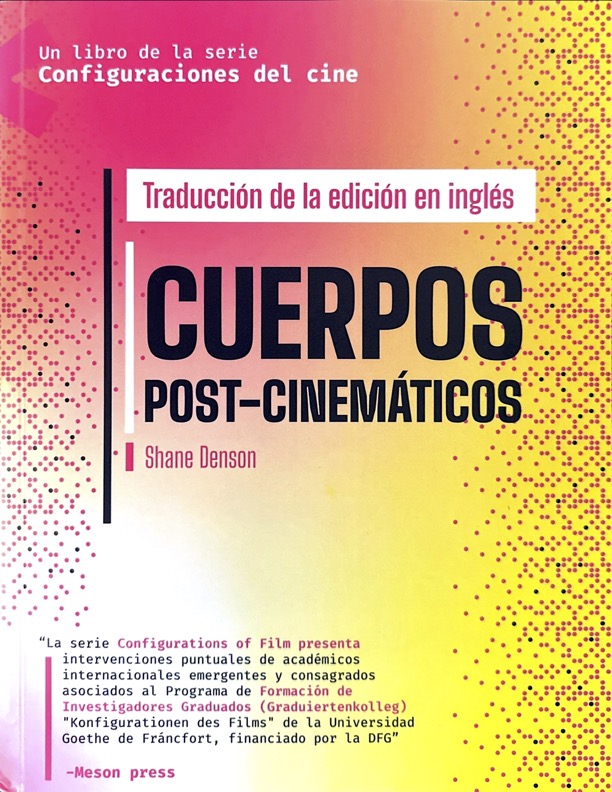
Cuerpos Post-Cinemáticos. Bogotá: Medio Studies/Universidad Nacional de Colombia, 2023.
This is a Spanish translation of Post-Cinematic Bodies, undertaken as a critical making and design project by Zenaida Osorio, Professor in the School of Graphic Design at the Universidad Nacional de Colombia in Bogotá, with her students. Interestingly, and openly, ChatGPT and DeepL were used to make the first pass at translating the open-access text, but then a team of eleven collaborators (Alejandro Guerrero, David Inagán, Natalia Correa, Natalia Montaña, Natalie Martin, Roxana Ayala, Selina Ojeda, Sofía Bernal, Santiago Narváez, William Camacho, and Wilmer Casallas) revised and corrected the translation. The whole team added a glossary of technical terms, a commentary (in English and Spanish) before each chapter and at the end of the book, and a set of QR-code–activated "visual comments" — a set of wonderfully designed objects that link the ideas of the book to the students' lived experience in Bogotá.
* * *
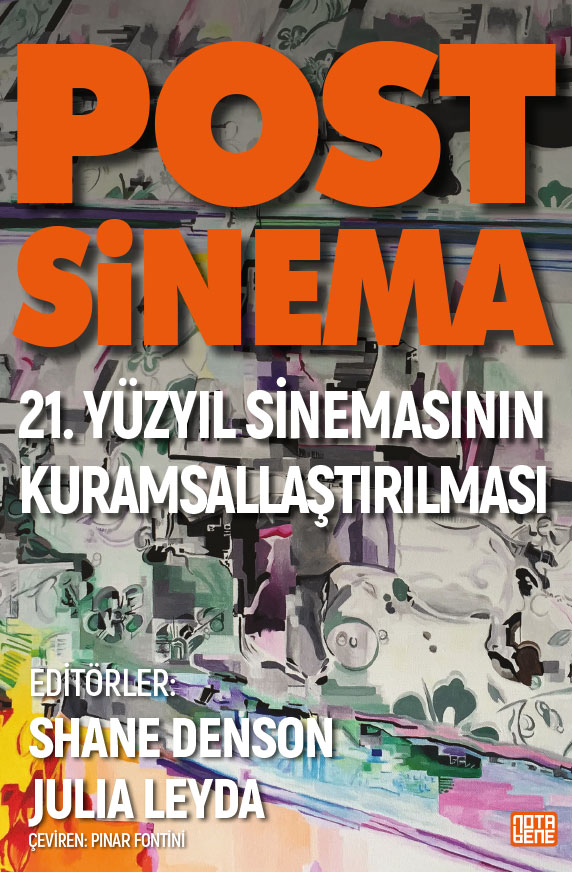
Post-Sinema – 21. Yüzyıl Sinemasının Kuramsallaştırılması. Edited by Shane Denson and Julia Leyda. Trans. Pinar Fontini. Istanbul: NotaBene Publishing, 2021.
This is a Turkish translation of select essays from Post-Cinema: Theorizing 21st-Century Film. Featuring essays by Lev Manovich, Steven Shaviro, Vivian Sobchack, Shane Denson, Caetlin Benson-Allott, Francesco Casetti, and Selmin Kara, as well as an introduction by Shane Denson and Julia Leyda.
20. yüzyılın baskın medyası olan sinema ve televizyon, kültürel duyarlılıklarımızı şekillendirdi ve yansıttı. Peki, 21. yüzyılda neler oluyor? Yeni dijital medya, yeni duyarlılıklar mı demek? 20. yüzyıl sineması, dijital ve bilgisayar tabanlı medya tarafından “aşıldığında”, yani Fredric Jameson’ın “kültürel baskın” dediği şey olmaktan çıktığında, sinemanın rolü veya konumu nasıl değişti? Shane Denson ve Julia Leyda’nın hazırladığı Post Sinema: 21. Yüzyıl Sinemasının Kuramsallaştırılması kitabı, eleştirel bir tavırla bu sorulara odaklanıyor. Kitap, başlangıç noktasını Steven Shaviro’nun “sinema sonrası duygulanım” kavramından alıyor. Yeni eleştiriye kelime dağarcığı yaratma, yeni medya ekolojisiyle uzlaşma amacıyla bir dizi kilit düşünürün fikirlerini genişleten ve geliştiren bir çalışma. Sinematik bir medya rejiminden sinema sonrası medya rejimine geçişin deneyimsel, teknolojik, politik, tarihsel ve ekolojik yönlerini inceleyerek, yeni zemini kırmanın temel sorularını araştırıyor; sinemanın ilk ve ikinci dönemi arasındaki sürekliliklerin yanı sıra kopuklukları da tartışıyor. Estetik ve biçim soruları, değişen teknolojik ve endüstriyel uygulamalarla, çağdaş sermaye oluşumlarıyla, kimlik, sosyal eşitsizlik ve toplumsal cinsiyet eşitsizliği gibi konulardaki kültürel kaygılarla örtüşüyor. Dijitalleşmenin, öylece kabul edilen gelenekler üzerindeki etkisi de oyunda. Aracılık, yasal ya da yasadışı yeni dağıtım biçimleri, türlere ve ayrı medya biçimlerine akademik ve eleştirel bağımlılık… Kısacası değişen paradigma, bu kitapta 21. yüzyıl sinemasının kuramsallaştırılması amacıyla bütün yönleriyle mercek altına alınıyor.
An interview with the editors, in Turkish, appeared in Gazete Duvar. The original English-language interview can be found here.
* * *
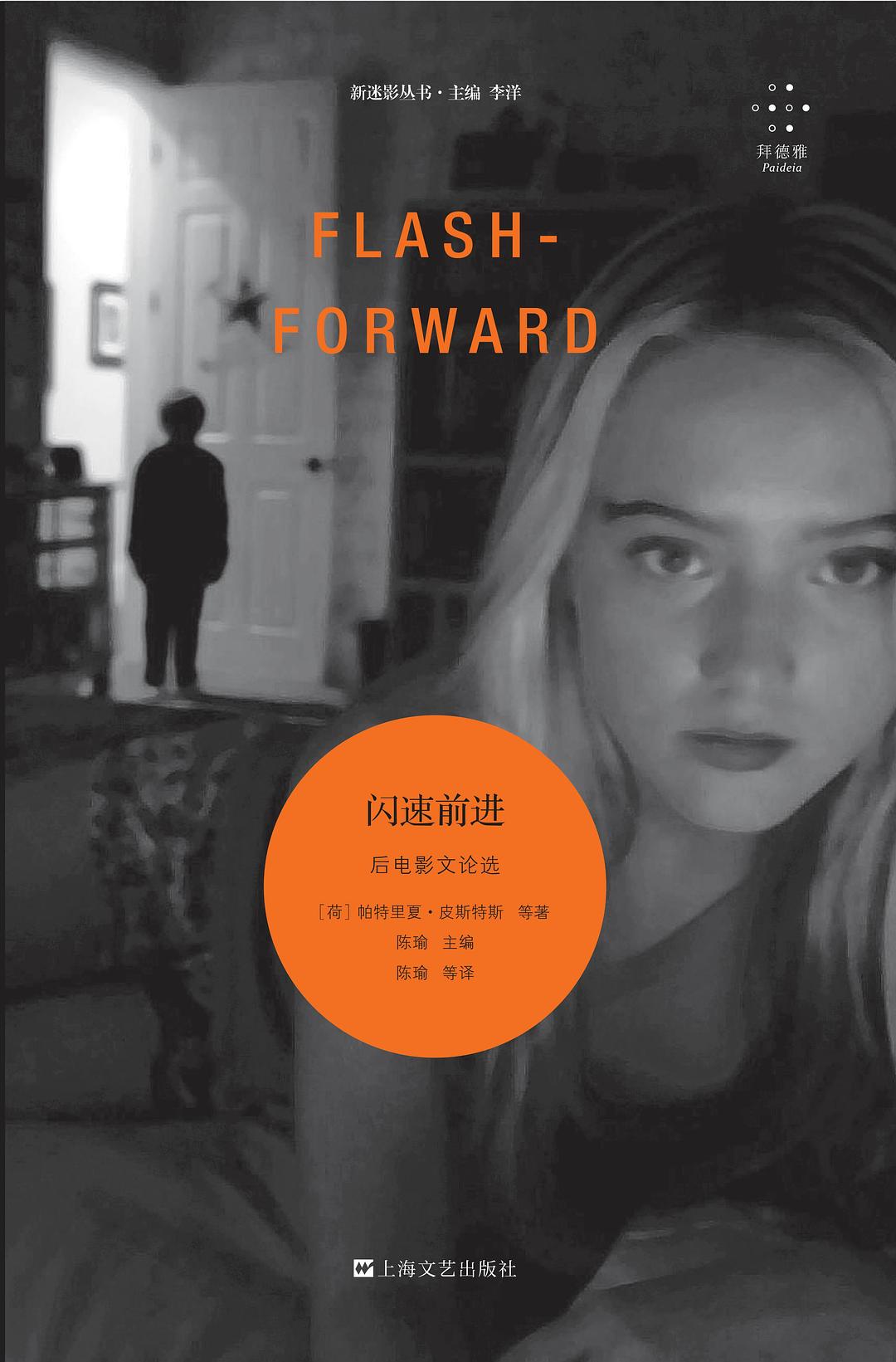
Flash-Forward. 闪速前进:后电影文论选.. Edited by Shane Denson and Julia Leyda, with Chen Yu. Shanghai: Shanghai Literature and Art Publishing House, 2023.
This is a Chinese translation of select essays from Post-Cinema: Theorizing 21st-Century Film. Featuring essays by Steven Shaviro, Shane Denson, Patricia Pisters, Andreas Sudmann, Sergi Sánchez, David Rambo, and others.
* * *